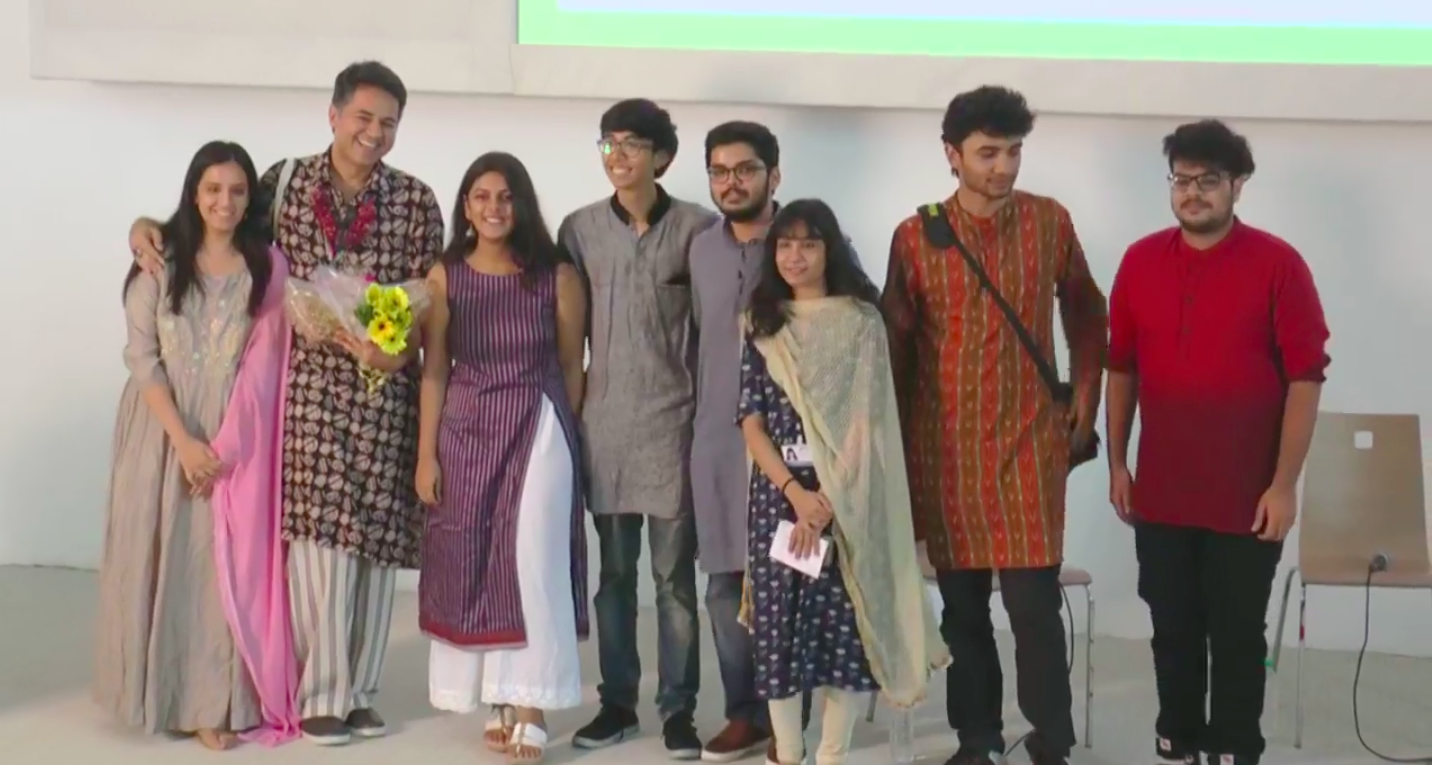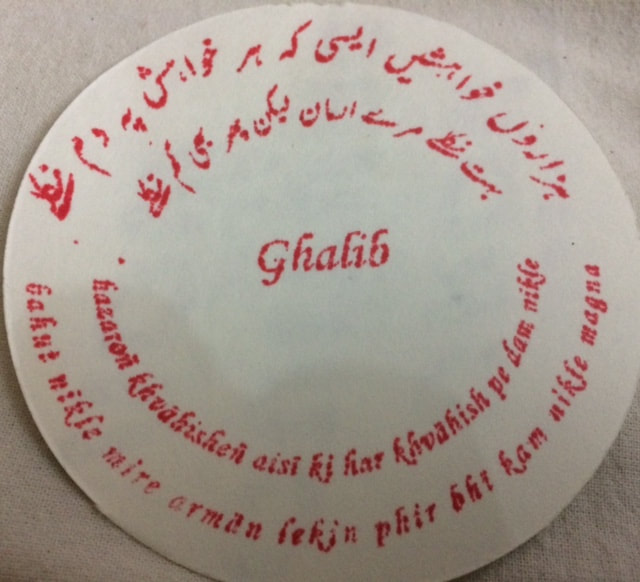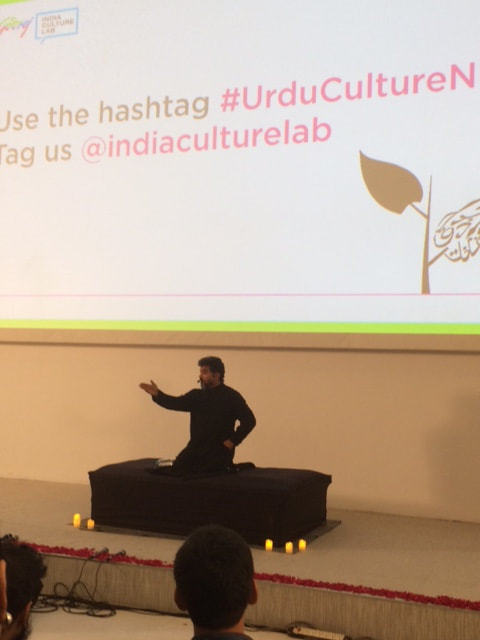|
The Godrej India Culture Lab has been churning out amazing events. I've been missing them due to my travel commitments. This week I'd blocked to paint the apartment, and for the 'Urdu Culture Now' event organized by the Godrej Culture Lab at Vikhroli, Mumbai. Just an hour journey by Ambernath local train, this event was a nice pre-monsoon break that was much needed from my DIY apartment painting mode. The event was nicely curated by a group of students, including two students of Tata Institute of Social Sciences (TISS), who were the first batch of Leadership Program Fellows. For me, it's always an honour to meet my humble motivating TISSian Profs Anjali Monterio and Jaysankar.. I still continue to draw inspiration from them and from their dedication in media and cultural studies. The event was a delicious kichidi of everything - almost everything - that comes under the umbrella of Urdu. It included: art exhibit, panel discussion, performances, and culinary delicacies. Exhibition The exhibit corner was small and nice with mix of poster work by Zeenat Kulavoor and Nasheet Shadani, books, Sound Zone, and even a Sticker corner - a sticker with your favourite poet's few quotes made a good take home souvenir. The Ghalib's famous quote printed in Urdu and Roman Script: hazaroñ khvãhisheñ aisi ki har khvahish pe dam nikle bahut nikle mere armän lekin phir bhi kam nikle magna Urdu aur mein It was Dec 1985: the first anniversary of the Bhopal disaster. My first-ever trip outside Maharastra. As a 10 year old I was the only child member of a singing group, Lok Sanskriti Kendra, which was somewhat an extension of a cultural wing of a political party. It didn't matter to me.. I was too young to understand politics, but the songs were motivating and I enjoyed the idea of going to places (Bombay mills union or farmer's movement) to sing! Proshanto da and Munni didi received an invitation for the team to sing at an event to mark the first anniversary in Bhopal. I was given a condition that my school class teacher of 5th standard/grade would've to give me permission! My class teacher was Hindi expert and her condition was I'd have to write an essay from my trip experience... something like Back to Office Report, but in Hindi! So I got a week's leave to visit Bhopal. We did the singing, and also were taken to field visit for meeting the families affected by the gas tragedy. As a child, I must have been in utter shock to see the impact of the disaster and began sobbing. Abba, one of the families who had lost his 8 yr old grandson in the Bhopal disaster, wanted to cheer me up. As an expression of love he gifted me one of his books in Urdu script with poems of Mir Taqi Mir, the 18th century Urdu poet. He made me memorize the name of this poet. He'd written my name in Urdu script on this gift book. It was a rich treasure for me and first familiarization with Urdu script. Urdu is one of the 12+ languages and dialects I think I understand ;-) Comprehending languages marks mastering in listening, talking, reading and writing - some languages I read and write better while others I can express/talk better. Urdu is the language that I am good at listening.. can't read and write, not yet. Panel Discussion The panel included poet Hussain Haidry, artist Zeenat Kulavoor, and Executive Editor of the Wire Urdu Mahtab Alam. I liked the way Annie Zaidi, writer and journalist, moderated smartly the discussion. A good line up but I guess there was no preparation among the panelist on the kind of discussion - it was more impromptu - which is fine, but wasn't knocking intellectual door. One reason I think for relatively weak discussion was that the topic of the panel was too generic. Hussain Haidry was asked to recite one of his poem by Annie, which he did brilliantly except that the last verse he was unable to recollect. Zeena Kulavoor I think is doing nice work with Urdu script, but she kind of failed to capitalise in sharing her talent - this was despite Annie's moderation in giving her a chance to share/describe with audience different types of formats of script within Urdu. Mahtab Alam tried to touch upon the issue of Urdu as a language and its existence, but overall the panel discussion revolved around Urdu in Bollywood. Or, perhaps I was expecting a bit too much from this panel. Performances Storytelling Danish Hussain created a good mood in the audience. He'd about 20 min slot, which in normal scenario is the time taken by the storytellers to build up a tempo with the audience. In brief, it was like a peck in the cheek As an amazing actor, he did his performance flawlessly - sharing information about Dastangoi and its historical transition over the centuries; how in 1881 first Dastan-e-Amir-Hamza stories published making it one of the longest written story; his theatre company the Hoshruba Repertory's approach of using multi-lingual storytelling; and finally throwing few examples of diversity of story telling - dastan-e-rokna, serafa, and aiyyari or trickery - all sweetly wrapped up in the limited given time. If one digs beyond Danish Hussain's storytelling its also all about making Urdu language public and 'marketable' - I'm using the term that Mahtab Alam had raised in the panel discussion. It was only a couple of weeks ago that I'd my first chance to see Danish's performance (read my blog Qissebaazi in May 2018). With today's glimpse I'm hoping to see many more in the near future. Pop music Pop-music and Urdu might sound like a strange bedfellows, but that's what Winit Tikoo is trying to proof the otherwise. I am not a pop music person, and anything new takes time for me to sink in. As such Winit Tikoo's performance was nice, and the audience enjoyed it. Always nice to see people with deep passion. He is one of them striving to compose music of Hindustani/ Urdu/Hindi poets independently as an artist. The traditional food, dawaat, was a nice arrangement (for an orphan/solo me). Food always is a good excuse to engage people to interact.
I loved this event and was glad to see it happening here in India/Vikhroli at the Godrej Culture Lab, which eventually (hopefully) will be a big plus towards building a creative commons. @purabibose.com
0 Comments
Leave a Reply. |
Privacy Policy: We use Google Analytics to collect data to improve the Website. By using and accessing the website you are consenting to use of Google Analytics. All Rights Reserved.
ARchIvES
March 2019
CATEGORIES
All
Privacy Policy: This website uses Google Analytics to improve the Website. By using and accessing the website you are consenting to use of Google Analytics.
|



 RSS Feed
RSS Feed
